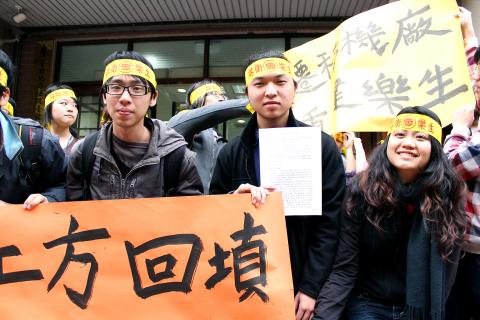Activists yesterday clashed with police during a protest outside Premier Jiang Yi-huah’s (江宜樺) residence, asking him to halt construction work at Losheng (Happy Life) Sanatorium and rebuild demolished buildings on the site.
“Premier Jiang, please save Losheng, halt the construction, rebuild the sanatorium,” dozens of members of the Youth Alliance for Losheng shouted as they clashed with police outside the premier’s residence in Taipei.
The activists arrived outside Jiang’s residence at about 6am without prior notice, hoping to see Jiang and deliver their petition to him before he left for work.

Photo: Hou Po-ching, Taipei Times
However, though the shouting attracted the attention of Jiang, who looked out from a second-floor window for a few seconds, he neither met with the students nor took their petition.
Police quickly removed the protesters by force and arrested 14.
Jiang made no comment on the protest when he left home at about 8am.
“We came here to see Jiang, because when we went to the Executive Yuan on Feb. 27, he simply ignored us,” Lin Ching (林沁), a National Taiwan University (NTU) student and a member of the alliance, told reporters. “In March last year, the government promised that construction at Losheng Sanatorium — suspended due to landslides — would not resume until they find a way to solve the landslide issue. However, construction resumed last week.”
“As a political science professor at NTU, Jiang visited Losheng in 2007 and signed a petition to support its preservation. We want to remind him of the promise he made, and ask him to host talks to resolve the issue,” Lin said.
Losheng Sanatorium, located in New Taipei City’s (新北市) Sinjhuang District (新莊), was built in the 1930s for people with leprosy.
A movement to preserve the sanatorium complex began in 2004 when it was selected as the site for a Mass Rapid Transit system maintenance depot and was to be completely demolished.
In 2007, a compromise plan allowed for the preservation of a small part of the complex, while the rest was to be demolished.
However, work has stopped several times due to landslides.
Another NTU student, Lin Hsiu-tung (林秀芃), accused Jiang of “not wanting to face the mistakes that the government made.”
“He saw us from his second-floor window, but would not meet us or speak with us,” Lin said.
Of the 14 students arrested, 13 were released soon after, while 21-year-old NTU student Kuo Kuan-chun (郭冠均) was charged with violations of the Social Order Maintenance Act (社會秩序維護法).
Several activists rallied outside the Taipei District Court in support of Kuo and accused the police of brutality as Kuo appeared in court.
At about 4:30pm, Kuo walked free as the judge cleared him of any wrongdoing.

ENDEAVOR MANTA: The ship is programmed to automatically return to its designated home port and would self-destruct if seized by another party The Endeavor Manta, Taiwan’s first military-specification uncrewed surface vehicle (USV) tailor-made to operate in the Taiwan Strait in a bid to bolster the nation’s asymmetric combat capabilities made its first appearance at Kaohsiung’s Singda Harbor yesterday. Taking inspiration from Ukraine’s navy, which is using USVs to force Russia’s Black Sea fleet to take shelter within its own ports, CSBC Taiwan (台灣國際造船) established a research and development unit on USVs last year, CSBC chairman Huang Cheng-hung (黃正弘) said. With the exception of the satellite guidance system and the outboard motors — which were purchased from foreign companies that were not affiliated with Chinese-funded

PERMIT REVOKED: The influencer at a news conference said the National Immigration Agency was infringing on human rights and persecuting Chinese spouses Chinese influencer “Yaya in Taiwan” (亞亞在台灣) yesterday evening voluntarily left Taiwan, despite saying yesterday morning that she had “no intention” of leaving after her residence permit was revoked over her comments on Taiwan being “unified” with China by military force. The Ministry of the Interior yesterday had said that it could forcibly deport the influencer at midnight, but was considering taking a more flexible approach and beginning procedures this morning. The influencer, whose given name is Liu Zhenya (劉振亞), departed on a 8:45pm flight from Taipei International Airport (Songshan airport) to Fuzhou, China. Liu held a news conference at the airport at 7pm,

Taiwan was ranked the fourth-safest country in the world with a score of 82.9, trailing only Andorra, the United Arab Emirates and Qatar in Numbeo’s Safety Index by Country report. Taiwan’s score improved by 0.1 points compared with last year’s mid-year report, which had Taiwan fourth with a score of 82.8. However, both scores were lower than in last year’s first review, when Taiwan scored 83.3, and are a long way from when Taiwan was named the second-safest country in the world in 2021, scoring 84.8. Taiwan ranked higher than Singapore in ninth with a score of 77.4 and Japan in 10th with

GRIDLOCK: The National Fire Agency’s Special Search and Rescue team is on standby to travel to the countries to help out with the rescue effort A powerful earthquake rocked Myanmar and neighboring Thailand yesterday, killing at least three people in Bangkok and burying dozens when a high-rise building under construction collapsed. Footage shared on social media from Myanmar’s second-largest city showed widespread destruction, raising fears that many were trapped under the rubble or killed. The magnitude 7.7 earthquake, with an epicenter near Mandalay in Myanmar, struck at midday and was followed by a strong magnitude 6.4 aftershock. The extent of death, injury and destruction — especially in Myanmar, which is embroiled in a civil war and where information is tightly controlled at the best of times —